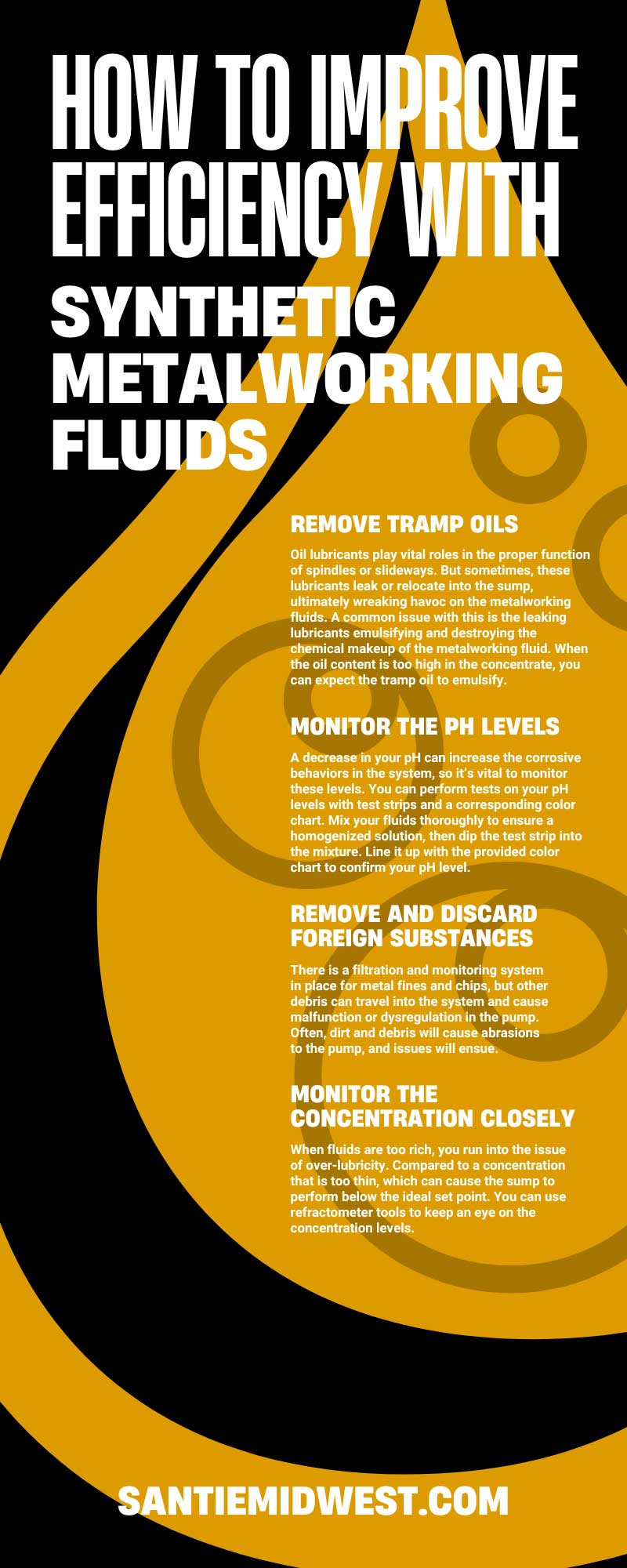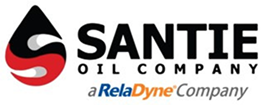Now more than ever, there is a rising cost of everything. Managing the performance of existing metalworking fluids can help alleviate these financial burdens by reducing expenditure on new fluids or machinery.
When metalworking fluids begin to malfunction or fail, the cost of replacing or repairing equipment can be astronomical. Through a precise fluids management system, you can prolong fluid life, ease the degradation of tools, and enhance the performance of manufacturing processes. Here is a detailed look at how to improve efficiency with synthetic metalworking fluids and deter performance disruptions.
Evaluate the Water Quality
The fluid content in a sump is 90 percent or more water mixed with the various oils. It’s vital the water quality and content are viable to allow proper stabilization. Most often, hard water causes significant trouble because it can cause a lot of instability—or worse, emulsion splitting.
By performing a series of water tests and administering treatment accordingly, you can help reduce the impacts of hard water or create a balanced molecular structure in the sump. The sump may throw an error if the ratios and molecular structure are incompatible, forcing the sump to work out of character.
Should your water be unduly hard, consider investing in a de-ionized line. Coolants can connect to the de-ionized lines to ensure suitable mixing occurs.
Filtration Measures
It’s possible that metals, fine metals, and chips make their way into a sump. While it’s normal, it’s vital they don’t linger long-term. You don’t want this type of debris to end up cycling through the equipment, as it can damage parts or the system as a whole.
Additionally, the fines and chips can create “dead zones,” which will trap the additives and cause complete system malfunction. Filtration measures are economically advantageous as they help reduce consumption and total spending on coolants.
Manage the Neat and Straight Oil
A significant advantage of neat or straight oils is that they do not require the same maintenance as a water-soluble coolant. As long as there is proper filtering on the metal fines and chips, you can prolong the performance life on neat oils and fluids.
Remove Tramp Oils
Oil lubricants play vital roles in the proper function of spindles or slideways. But sometimes, these lubricants leak or relocate into the sump, ultimately wreaking havoc on the metalworking fluids. A common issue with this is the leaking lubricants emulsifying and destroying the chemical makeup of the metalworking fluid. When the oil content is too high in the concentrate, you can expect the tramp oil to emulsify.
Using synthetic metalworking coolants can help tremendously. These fluids are excellent at rejecting the tramp oil and deterring emulsification. The remaining or floating oils are removable with a skimmer, but it’s important to catch them before damage begins. When floating oils linger too long, the machining can experience oil misting, clogged filters, or destruction of electrical components. You can install a skimmer to aid in timely removal.
Monitor the pH Levels
The alkalinity of your fluids is a matter of high importance. Monitoring the pH levels is vital to ensuring performance and fluid health. Any time you see the pH decreasing, it’s imperative to increase it. A pH below 8 can indicate trouble but is manageable. When the pH drops to 7, you must replace the entire coolant.
A decrease in your pH can increase the corrosive behaviors in the system, so it’s vital to monitor these levels. You can perform tests on your pH levels with test strips and a corresponding color chart. Mix your fluids thoroughly to ensure a homogenized solution, then dip the test strip into the mixture. Line it up with the provided color chart to confirm your pH level. Once you receive this information, you can begin adjusting accordingly.
Remove and Discard Foreign Substances
There is a filtration and monitoring system in place for metal fines and chips, but other debris can travel into the system and cause malfunction or dysregulation in the pump. Often, dirt and debris will cause abrasions to the pump, and issues will ensue.
You can improve the performance of your coolants and system by filtering through solids and other radicals or investing in a defoamer. Before you can recharge your sump, it’s critical that you remove the cleaners from the system. The best maintenance for this issue is usually thorough preparation and early prevention.
Monitor the Concentration Closely
Technological advancements have helped improve the quality of metalworking fluids. But that does not mean they are immune to improper concentrations. Running these fluids at the correct concentration can help them perform their duties while ensuring the health of machining. A concentration that is too thin or too rich will automatically limit its ability to function optimally.
When fluids are too rich, you run into the issue of over-lubricity. Compared to a concentration that is too thin, which can cause the sump to perform below the ideal set point. You can use refractometer tools to keep an eye on the concentration levels. These are usable daily, sometimes as frequently as twice a day, depending on your normal operating demands. You want to ensure consistency across the board, so the same individual should perform the testing each time.
You can also help maintain consistent concentration by utilizing automatic mixers. Avoid adding water, coolants, or other solutions in an effort to create balance in the sump. You can install a digital monitoring system if concentration becomes a repeated sore spot, as it helps manage various factors, including concentration and pH levels.
Key Takeaways
Improving the efficiency of your synthetic metalworking fluids comes with close management of other working parts. It’s essential to view your sump as one working system and not many individual parts to ensure cohesion across the board. Protecting your system is vital with the increasing costs and demand for metalworking fluids. In addition, the cost of replacing or repairing essential parts can be astronomical for facilities.
Contact Santie Oil Company to learn more about your facility’s needs. We are the industry-leading wholesale and bulk supplier of metalworking fluids, coolants, and much more!


